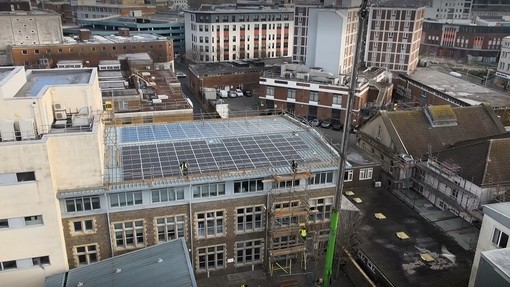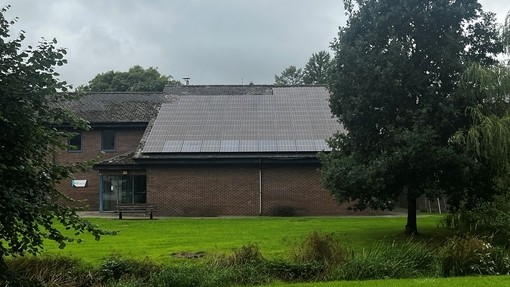UWTSD teams up with EDF and The Energy Consortium
The University of Wales Trinity Saint David (UWTSD) has partnered with the energy company EDF and The Energy Consortium (TEC) as part of its journey towards Net Zero.

The University of Wales Trinity Saint David (UWTSD) has partnered with the energy company EDF and The Energy Consortium (TEC) as part of its journey towards Net Zero.
This partnership has led to the installation of over 1200 Solar PV panels on 6 buildings across the University’s estate in Swansea and Lampeter. The largest of these installations is on the Dynevor building in the centre of Swansea.
Dan Priddy, Finance and Business Performance Manager UWTSD explains:
“We’d already done many of the quick wins like switching to LED lightbulbs, installing time switches, and building insulation. It was time to look at how we could overcome the barriers to realising bigger ideas, like self-generation, that can make a bigger difference. After all, we’re in the business of teaching students to think out of the box, so we needed to lead the way.”

The Energy Consortium (TEC) supported the University in looking at how it could overcome some of the barriers unique to the sector that could prevent it generating its own renewable energy including the initial cost outlay for the equipment, or the time required for installation.
Paula Ponting, Member Services Advisor of TEC, explains, some of the hurdles that the education sectors can face. She said:
“Procurement can be a complex process, requiring additional investment, time, and expertise. Access for installation can be difficult, too, as the priority in term time must be to maintain the safety, continuity, and convenience of the student experience. Then, of course, there’s pressure on budgets, with the current uncertainty and flux, as well as competing demands for funding.”
“The key to unlocking this opportunity, at speed, is the Framework that TEC offers to its members, with EDF as the supplier partner who offer additional Net Zero renewable energy solutions.
“Specially designed for educational organisations, it ensures a simple, compliant pathway to installing self-generation equipment. Each step of the way is already defined, agreed and proven. So, it’s easier for energy managers in educational organisation to get budget ringfenced, get internal stakeholders on board and get the project off the ground. Our aim is to help educational organisations achieve Net Zero, not only for their campuses but also for their students.”
Peter Darke, Relationship Manager of EDF, explains how the partnership works.
“Through the Framework, TEC provides a bridge between educational organisations, who are looking to implement sustainable energy solutions – and sustainable energy providers like EDF, who also bring experience, expertise, and innovation.
Dan Priddy added:
“The University’s roots date back 200 years and it’s been witness to so many innovations throughout that period. Now, we’re hoping to lead the way in sustainability and towards Net Zero.
“Thanks to the solar panels installed on three rooftops, the Dynevor building, which is home to UWTSD’s Swansea Art College, now runs on solar. In the 1820s, who would have thought that in the 2020s, energy from the sun would be powering our students’ work in art and design and a host of other disciplines utilising digital solutions. But this is only the beginning for us.
“With TEC and EDF behind us, we’ll continue to not just roll out our solar generation project across our campuses. But we’re also open to other sustainable energy opportunities too, using new sustainable energy technologies as they emerge.”
The University’s commitment to sustainability is a key theme and it is welcomed by its students.
Lucy Fairbrother, from Bristol, who is in the final year of the Environment, Sustainability & Climate Change says:
“It’s one thing just putting out statements saying you’re environmentally friendly but actually putting investment into solar energy, that takes commitment.
While Joshua Todd, from Stroud, Gloucestershire, who is studying Energy & Environmental Engineering agrees:
“I’m currently looking into the refinements to building systems to make them more energy efficient, along with energy delivery systems. My generation appreciates being able to work and study inside an energy efficient building. For us, it means that our future is looking brighter each day”.
Professor Dylan Jones, Deputy Vice-Chancellor concluded:
“The road to Net Zero is relatively uncertain, but the answers to those uncertainties lie within our student body.
“Our role, whatever job title we have, is to encourage all our students to think and act differently. And this self-generation programme is part of that student experience.
“Hopefully, it will power the legacy this next generation leaves behind: a more sustainable world.”
Further Information
Arwel Lloyd
Principal PR and Communications Officer
Corporate Communications and PR
Email: arwel.lloyd@uwtsd.ac.uk
Phone: 07384 467076
